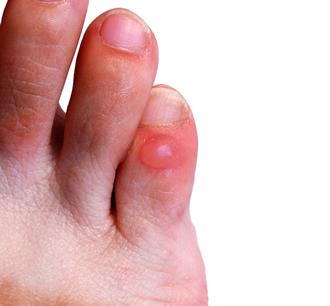Preventing Blisters on Your Feet

- posted: Feb. 11, 2022
A blister can be a real nuisance. It can make it uncomfortable to walk around, let alone try to go on your run. Fortunately, there are some simple things you can do to reduce your risk of developing blisters. Take care of your feet and they will take care of you. Of course, if you have diabetes or nerve damage in your feet and you do find yourself dealing with a blister, it’s important to always turn to a podiatrist right away for care.
Wear the Proper Shoes
Whether you’re hiking, running, or simply walking to work, it’s important that you are wearing the appropriate shoes for the job. Shoes that don’t provide your feet with enough cushion and support, especially when pounding the pavement, can leave you dealing with blisters, calluses, and other foot injuries. Make sure that you are also getting shoes that provide the ideal fit. Shoes that are too tight or loose can rub against the skin and result in blisters.
Apply Padding
There are blister pads on the market for a reason! Even if you are wearing properly fitted footwear, you may still find that you need a little added protection for your feet. A blister pad can be used to protect a blister that you have or it can be used in places that are prone to blisters.
Wear the Right Socks
The socks that you wear are just as important for maintaining healthy feet as the shoes that you wear. Choose socks that wick away moisture and consider doubling up on socks if you are getting ready to participate in an activity that increases your chances of developing a blister. The added layer can provide more protection for your feet. If your socks become wet or moist, it’s important that you change your socks right away.
Use a Lubricant Before Exercise
Shoes and socks that rub against the feet can lead to blisters, so it’s important to reduce this type of friction by keeping feet lubricated. This is particularly important for runners or hikers. Apply petroleum jelly to the feet so that they are more likely to slide rather than rub against shoes and socks.
A podiatrist can recommend the appropriate footwear for you, provide custom orthotics and ensure that you provide your feet with the support and cushioning they need for all of your activities to prevent blisters from happening to you. If blisters are a common problem, talk with your podiatrist about how you can prevent this from happening.

- posted: Feb. 11, 2022
A blister can be a real nuisance. It can make it uncomfortable to walk around, let alone try to go on your run. Fortunately, there are some simple things you can do to reduce your risk of developing blisters. Take care of your feet and they will take care of you. Of course, if you have diabetes or nerve damage in your feet and you do find yourself dealing with a blister, it’s important to always turn to a podiatrist right away for care.
Wear the Proper Shoes
Whether you’re hiking, running, or simply walking to work, it’s important that you are wearing the appropriate shoes for the job. Shoes that don’t provide your feet with enough cushion and support, especially when pounding the pavement, can leave you dealing with blisters, calluses, and other foot injuries. Make sure that you are also getting shoes that provide the ideal fit. Shoes that are too tight or loose can rub against the skin and result in blisters.
Apply Padding
There are blister pads on the market for a reason! Even if you are wearing properly fitted footwear, you may still find that you need a little added protection for your feet. A blister pad can be used to protect a blister that you have or it can be used in places that are prone to blisters.
Wear the Right Socks
The socks that you wear are just as important for maintaining healthy feet as the shoes that you wear. Choose socks that wick away moisture and consider doubling up on socks if you are getting ready to participate in an activity that increases your chances of developing a blister. The added layer can provide more protection for your feet. If your socks become wet or moist, it’s important that you change your socks right away.
Use a Lubricant Before Exercise
Shoes and socks that rub against the feet can lead to blisters, so it’s important to reduce this type of friction by keeping feet lubricated. This is particularly important for runners or hikers. Apply petroleum jelly to the feet so that they are more likely to slide rather than rub against shoes and socks.
A podiatrist can recommend the appropriate footwear for you, provide custom orthotics and ensure that you provide your feet with the support and cushioning they need for all of your activities to prevent blisters from happening to you. If blisters are a common problem, talk with your podiatrist about how you can prevent this from happening.
